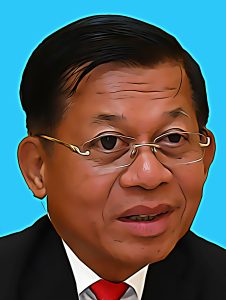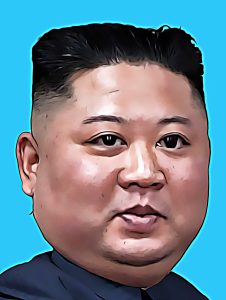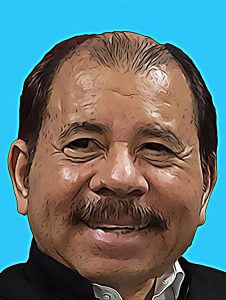1 Dec 2022 | Saudi Arabia, Tyrant of the Year 2022
 “Mohammed bin Salman should be awarded the title of ‘tyrant of the year’ not only because of his track record of censorship and suppression, but also because of the potential for violent tyranny to come” says Emma Sandvik Ling, partnerships and fundraising manager at Index on Censorship.
“Mohammed bin Salman should be awarded the title of ‘tyrant of the year’ not only because of his track record of censorship and suppression, but also because of the potential for violent tyranny to come” says Emma Sandvik Ling, partnerships and fundraising manager at Index on Censorship.
At only 37 years old, Mohammed bin Salman, colloquially referred to as MBS, is the youngest of the tyrants on our list. He therefore has the potential to offer a suppressive regime for decades to come.
In 2022, MBS celebrated his appointment as prime minister. The crown prince and de facto ruler has held various political positions since he became minister of defence in 2015, though his father King Salman bin Abdulaziz, 86, still holds the throne.
While Saudi Arabia is committed to a more liberal, globalist image, those calling for freedom of expression still face harsh punishments. In October, three members of the Al-Huwaiti tribe were sentenced to death for resisting eviction caused by the $500 billion NEOM development. Meanwhile, the University of Leeds student Salma al-Shehab has been sentenced to 34 years in prison for retweeting Saudi activists. On 12 March, 81 men were executed for “terrorism and holding deviant beliefs” including 41 who were believed to be minority Shia Muslims who took part in anti-govenrment demonstrations in 2011. Women, minority groups, activists, and journalists alike face severe consequences for speaking out against the regime.
Adding insult to injury, Bin Salman’s behaviour appears to be tolerated – if not accepted – internationally. In November 2022 the US State department granted the crown prince diplomatic immunity from prosecution over the brutal assassination of journalist Jamal Khashoggi. This is despite President Biden’s repeated assurance that he would hold MBS accountable for his involvement. Due to Saudi-Arabia’s important financial and strategic ties, MBS looks poised to rule for years to come.
“As the world watches on, bin Salman continues to exert power in horrific ways. His rule will likely continue to restrict basic freedoms in Saudi Arabia and beyond,” says Sandvik Ling.
1 Dec 2022 | Burma, Tyrant of the Year 2022
 “As a child Aung San Suu Kyi was a celebrated heroine in my family home and Myanmar, an authoritarian regime determined to squash democracy. For a few years there was hope, although not for the Rohinghya community (thanks to Min Aung Hlaing), until the military coup of 2021,” says Index on Censorship CEO Ruth Anderson.
“As a child Aung San Suu Kyi was a celebrated heroine in my family home and Myanmar, an authoritarian regime determined to squash democracy. For a few years there was hope, although not for the Rohinghya community (thanks to Min Aung Hlaing), until the military coup of 2021,” says Index on Censorship CEO Ruth Anderson.
In February 2021 Min Aung Hlaing seized power – declaring himself commander-in-chief of Myanmar and consolidating all political power into the State Administration Council – a body which he also chairs. He has since sought to quash all dissent. Challenge is not tolerated, politicians have been arrested and imprisoned on spurious charges. Since the coup 2,530 civilians have been killed by the military, 13,000 people remain in detention and 128 political prisoners have been sentenced to death, according to the Assistance Association for Political Prisoners.
In a series of court cases since the military coup, former leader Aung Sun Suu Kyi has now been sentenced to 26 years’ imprisonment.
“These acts alone would warrant his crown as Tyrant of the Year but when you also consider his personal treatment of the Rohingya community then it’s difficult to see how anyone else qualifies for the title,” says Anderson. “Even before the coup Min Aung Hlaing was accused of acts of genocide against the Rohinghya minority – over one million Rohingya have been forced to flee Myanmar, and available data suggests that over 24,000 Rohingya have been systematically murdered by the state, over 18,000 women and girls raped and 36,000 thrown into fires. All by direct order of Min Aung Hlaing. The UN has declared that he should be tried for war crimes at the Hague. This man is a tyrant by every definition.”
1 Dec 2022 | North Korea, Tyrant of the Year 2022
 “As far as freedoms go, there is no landscape so bleak as North Korea,” says Index assistant editor Katie Dancey-Downs. “Under Kim Jong-un’s totalitarian regime, citizens are fed propaganda in lieu of actual food. And as for elections? The ballot paper has only one option.”
“As far as freedoms go, there is no landscape so bleak as North Korea,” says Index assistant editor Katie Dancey-Downs. “Under Kim Jong-un’s totalitarian regime, citizens are fed propaganda in lieu of actual food. And as for elections? The ballot paper has only one option.”
Kim Jong-un continues to rule as the supreme leader of North Korea, keeping alive the brutal legacy of the Kim dynasty. He makes a grand show of nuclear weapons on the global stage (including recently firing more than 20 missiles across the sea border with South Korea) while much of the country lives in extreme poverty and under close surveillance. One of Kim’s most recent photo opportunities was alongside what is believed to be an intercontinental ballistic missile – he watched as the test was launched.
Criticism of the regime is not tolerated. Dissent is punished severely. Executions and prison camps drive fear under this totalitarian regime, while lavish displays of affection are demanded by its leader.
“North Koreans are nothing short of modern-day slaves who have been deprived of freedom of expression and movement,” says Jihyun Park, a UK-based activist who escaped from North Korea – twice. “North Korea is a place where I lived like a machine and remained silent.”
North Korea lands in last place in the Reporters Without Borders’ press freedom index, out of 180 countries. Only official government news sources are permitted, which are packed with propaganda. No outside information gets in, and what the rest of the world gets to see is controlled with the tightest of grips. Some tyrants might overreach on internet clampdowns, but for Kim it’s all or nothing. North Koreans only have access to a localised intranet, with absolutely no view of the world wide web in any form.
With Kim Jong-un the third generation in the dynasty, and talks of his eventual successor hotting up, Dancey-Downs comments: “Perhaps beyond simply Tyrant of the Year, Kim should be up for a lifetime achievement award.”
1 Dec 2022 | Nicaragua, Tyrant of the Year 2022
 There is nothing more disappointing (or predictable) than a revolutionary hero turned tyrant. In the great tradition of Lenin and Castro, Ortega promised a new dawn as the leader of the rebel Sandinista National Liberation Front which opposed the Somoza family dictatorship in the late 1970s.
There is nothing more disappointing (or predictable) than a revolutionary hero turned tyrant. In the great tradition of Lenin and Castro, Ortega promised a new dawn as the leader of the rebel Sandinista National Liberation Front which opposed the Somoza family dictatorship in the late 1970s.
Ortega first took power in 1979 after the overthrow of the regime and served until 1990, first as the head of the Junta of National Reconstruction and then as President. After an absence of 17 years, he was re-elected in 2007 and has remained in office ever since. His rule has become increasingly brutal with crackdowns on his former political allies and opponents to his autocratic methods.
Protests against his regime began in 2014 over plans to grant a concession to a Chinese businessman to build the Nicaragua Canal. Protests were led by local campesinos whose faced the expropriation of their land. Further protests by indigenous people who blamed the government for forest fires flared in 2018 and compounded by opposition to tax increases and benefit reductions.
According to Human Rights Watch, Ortega has dismantled nearly all institutional checks on his presidential power. Opposition parties were banned in advance of the 2021 presidential elections and opponents imprisoned. Civil society has been neutered and an estimated 2,000 NGOs closed down with organisations receiving funding from international sources labelled as foreign agents. Over 100 journalists have been forced into exile in Costa Rica along with an estimated 80,000 asylum seekers.
In elections held in November 2022, the Sandinista Liberation Front announced it had won control of all 153 municipalities in the country. The result was inevitable after the banning of all opposition parties.
“For his critics, the Nicaraguan president has recreated a family dictatorship on the lines of the hated Somozas. His vice-president Rosario Murillo would disagree. She described the recent elections as ‘an exemplary, marvellous formidable day in which we confirm our calling for people.’ But then she is Ortega’s wife,” says Index’s editor-at-large Martin Bright.
 “Mohammed bin Salman should be awarded the title of ‘tyrant of the year’ not only because of his track record of censorship and suppression, but also because of the potential for violent tyranny to come” says Emma Sandvik Ling, partnerships and fundraising manager at Index on Censorship.
“Mohammed bin Salman should be awarded the title of ‘tyrant of the year’ not only because of his track record of censorship and suppression, but also because of the potential for violent tyranny to come” says Emma Sandvik Ling, partnerships and fundraising manager at Index on Censorship. 


